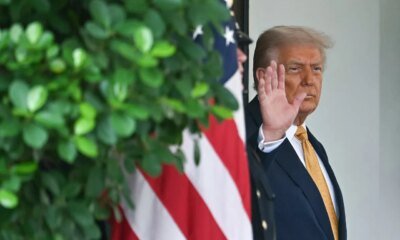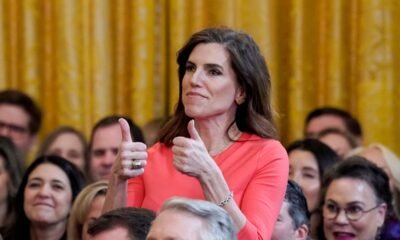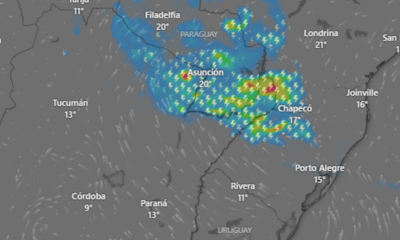INTERNACIONAL
Trump confirms 2 nuclear submarines are ‘in the region’ to counter Russia
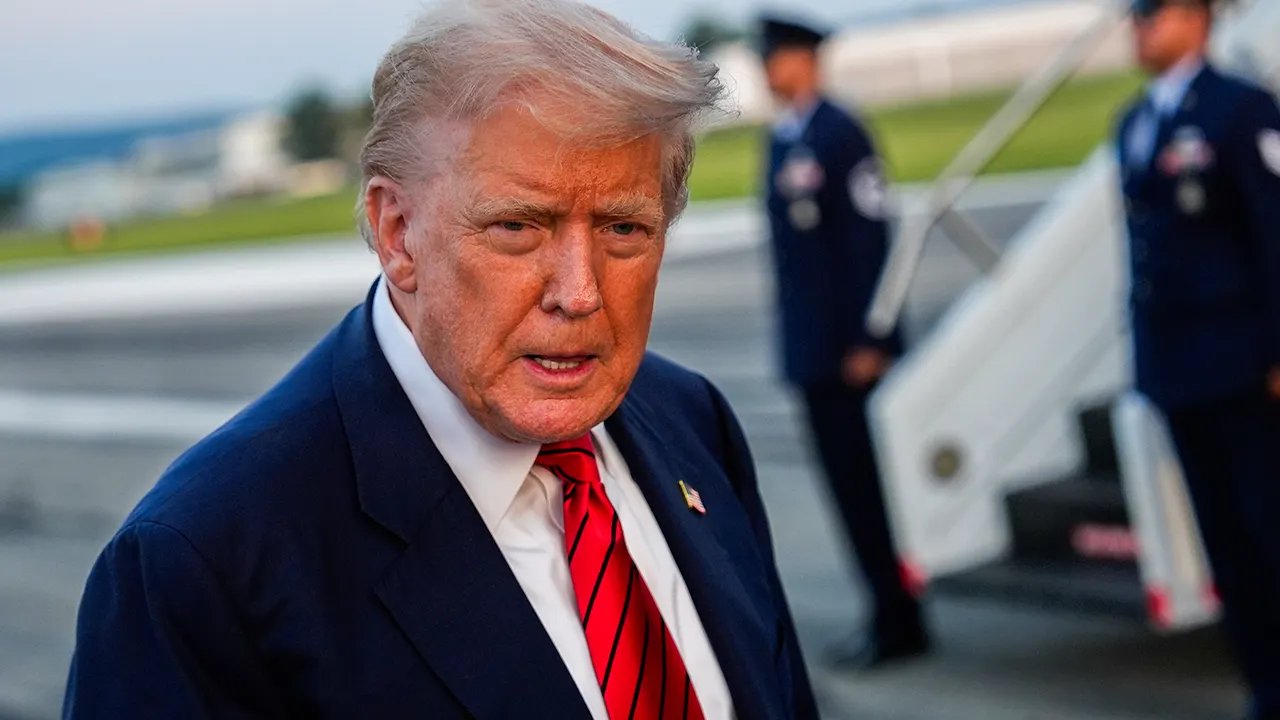
NEWYou can now listen to Fox News articles!
President Donald Trump told reporters on Sunday that nuclear submarines he ordered to counter Russia are now «in the region» ahead of U.S. special envoy Steve Witkoff’s visit.
Before boarding Air Force One in Allentown, Pa., to return to Washington, D.C., Trump was asked if the nuclear submarines had already been deployed to «face Russia.» Trump said on TRUTH Social on Friday that he ordered two nuclear submarines «to be positioned in the appropriate regions» in response to what he considered «highly provocative statements» from former Russian president Dmitry Medvedev about potential war with the U.S.
«I’ve already put out a statement and the answer is they are in the region, yeah, where they have to be,» Trump told reporters at Lehigh Valley International Airport on Sunday.
Trump said that Witkoff is expected to travel to Russia on «Wednesday or Thursday.» Russian state media reported Monday that Witkoff would arrive on Wednesday. The visit comes ahead of the Friday deadline Trump set for Russian President Vladimir Putin to reach a ceasefire agreement with Ukraine or face additional sanctions and tariffs. Trump also has warned about potential secondary tariffs for the purchasers of Russian energy.
TRUMP BRUSHES BACK RUSSIA’S MEDVEDEV AFTER ‘WAR’ WARNING: ‘WATCH HIS WORDS’
President Donald Trump speaks with reporters before boarding Air Force One at Lehigh Valley International Airport, Sunday, Aug. 3, 2025, in Allentown, Pa. (AP Photo/Julia Demaree Nikhinson)
«Well, there’ll be sanctions, but they seem to be pretty good at avoiding sanctions. You know, they’re wily characters, and they’re pretty good at avoiding sanctions,» Trump told reporters in front of Marine One. «So we’ll see what happens.»
Asked about Witkoff’s message to Moscow and if there’s anything the Russians can do to avoid sanctions, Trump said Sunday, «Yeah, get a deal where people stop getting killed.»
«A tremendous number of Russian soldiers have been killed. And likewise Ukraine, a lower number, but still thousands and thousands of people. And now we’re adding towns where they’re being hit by missiles. So it’s a lot of people being killed in that ridiculous war,» Trump said. «We stopped a lot of countries from war, India and Pakistan, we stopped a lot of countries. And we’re going to get that one stopped too. Somehow. We’re going to get that one stopped. That’s a really horrible war.»
«This should be the easiest to stop, and it’s not,» Trump added.
Before ordering the deployment of nuclear submarines last week, Trump had warned Medvedev, the deputy chairman of Russia’s Security Council, to «watch his words.» Medvedev had complained that Trump had shortened the Russia-Ukraine ceasefire deadline from 50 days to just 10 to 12 days, saying that the «ultimatum» was threat toward war «not between Russia and Ukraine, but with his own country.»
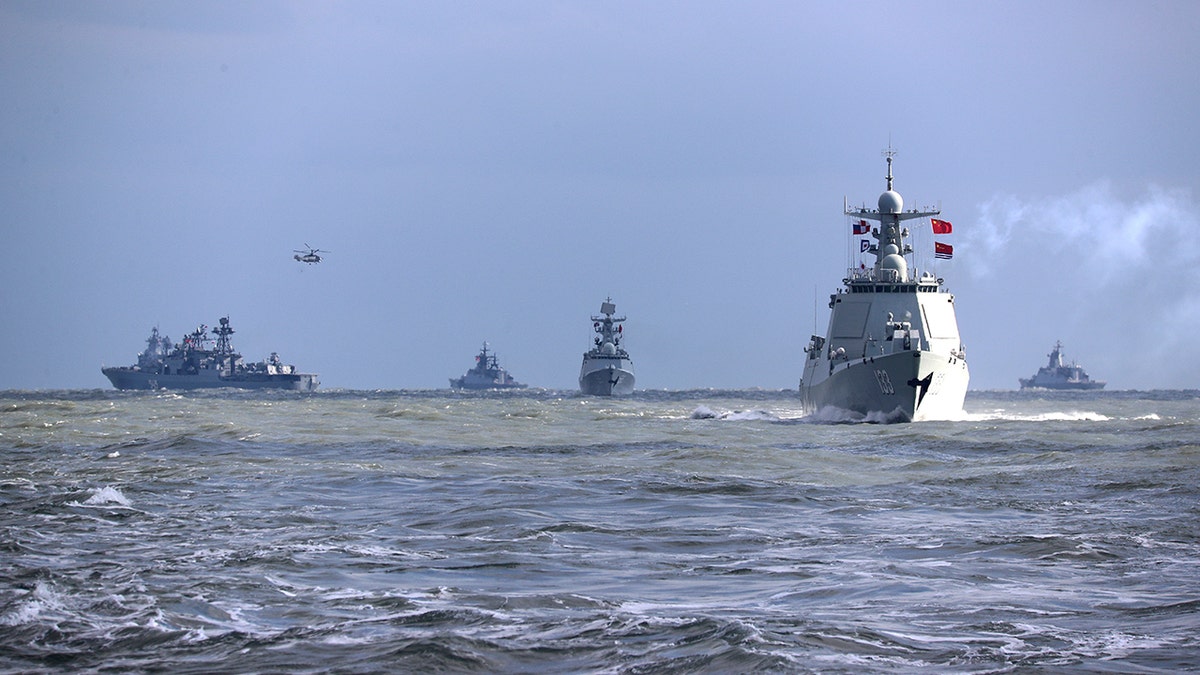
In this photo released by Xinhua News Agency, Chinese and Russian warships take part in a joint naval drills in the East China Sea, Dec. 27, 2022. (Xu Wei/Xinhua via AP, File)
Despite Trump cautioning that Medvedev was entering «dangerous territory,» the Russian official doubled down and referenced Russia’s «Dead Hand» – the Cold War-era automated nuclear retaliation system developed by the Soviet Union.
The U.S. and Russia hold the largest nuclear arsenals in the world.
Top Kremlin spokesman Dmitry Peskov reportedly downplayed the U.S. deployment of nuclear submarines Monday. He told reporters that «American submarines are already on combat duty – that’s a constant process» and the Russians «don’t believe this is a case of any sort of escalation,» according to the Russian-language news website Meduza.
Asked about Medvedev’s remarks, Peskov said members of the leadership in any country have different views but stressed Putin definitively decides Russian foreign policy.
«We approach any statements related to nuclear issues with great caution,» Peskov added at the press conference, according to The Moscow Times. «Russia is firmly committed to nuclear non-proliferation, and we believe that all parties should exercise the utmost restraint when it comes to nuclear rhetoric.»
TRUMP ANNOUNCES 25% TARIFF ON INDIA, SLAMMING ‘OBNOXIOUS’ TRADE BARRIERS, RUSSIA MILITARY AND ENERGY BUYS
Meanwhile, Beijing and Moscow have deepened their ties in recent years, with China providing an economic lifeline to Russia in the face of Western sanctions over the 2022 invasion of Ukraine.
Russia and China have started mock combat drills and other war games in the Sea of Japan, The Telegraph reported. Citing a statement from the Chinese Defense Ministry, the newspaper said the three-day exercise involves four Chinese vessels, including the guided-missile destroyers Shaoxing and Urumqi, and entails «submarine rescue, joint anti-submarine, air defense and anti-missile operations, and maritime combat,» as well as naval patrols in «relevant waters of the Pacific.»
At a press conference announcing details of the annual drills last week, Chinese Defense Ministry spokesperson Zhang Xiaogang said the Joint Sea 2025 exercise would be held in the air and seas near the Russian port city of Vladivostok, positioned across the sea from Japan’s west coast. Last year, the drill was held off southern China in the South China Sea.
«This is an arrangement within the annual cooperation plan between the Chinese and Russian militaries. It is not targeted at any third party, nor is it related to the current international and regional situation,» Zhang said.
China and Russia also signed a «no-limits» economic partnership shortly after the war in Ukraine began.
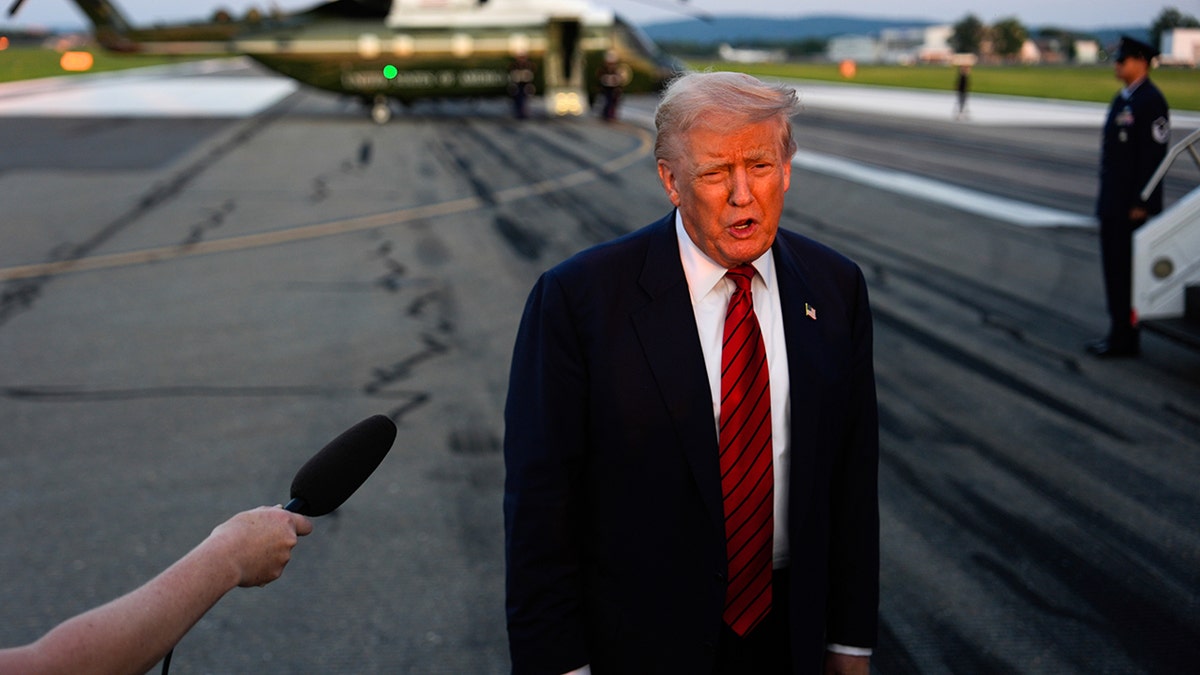
President Donald Trump speaks with reporters before boarding Air Force One at Lehigh Valley International Airport, Sunday, Aug. 3, 2025, in Allentown, Pa. (AP Photo/Julia Demaree Nikhinson)
Zhang criticized ongoing drills that the U.S. Air Force is conducting with Japan and other partners in the western Pacific. Resolute Force Pacific is the largest contingency-response exercise ever conducted by the Air Force in the region, according to the U.S. military. The U.S. Air Force has said their exercise will train its forces to maintain readiness and execute missions under stress to demonstrate their ability to defend the United States and partner nations in the Pacific.
«The U.S. has been blindly flexing muscles in the Asia-Pacific region and attempting to use military drills as a pretext to gang up, intimidate and pressure other countries, and undermine peace and stability in the region,» Zhang told reporters.
CLICK HERE TO GET THE FOX NEWS APP
Japan’s Defense Ministry said in an annual report earlier this month that China’s growing military cooperation with Russia poses serious security concerns.
The Associated Press contributed to this report.
ukraine,china,russia,donald trump,foreign policy
INTERNACIONAL
Trump’s tariff power grab barrels toward Supreme Court
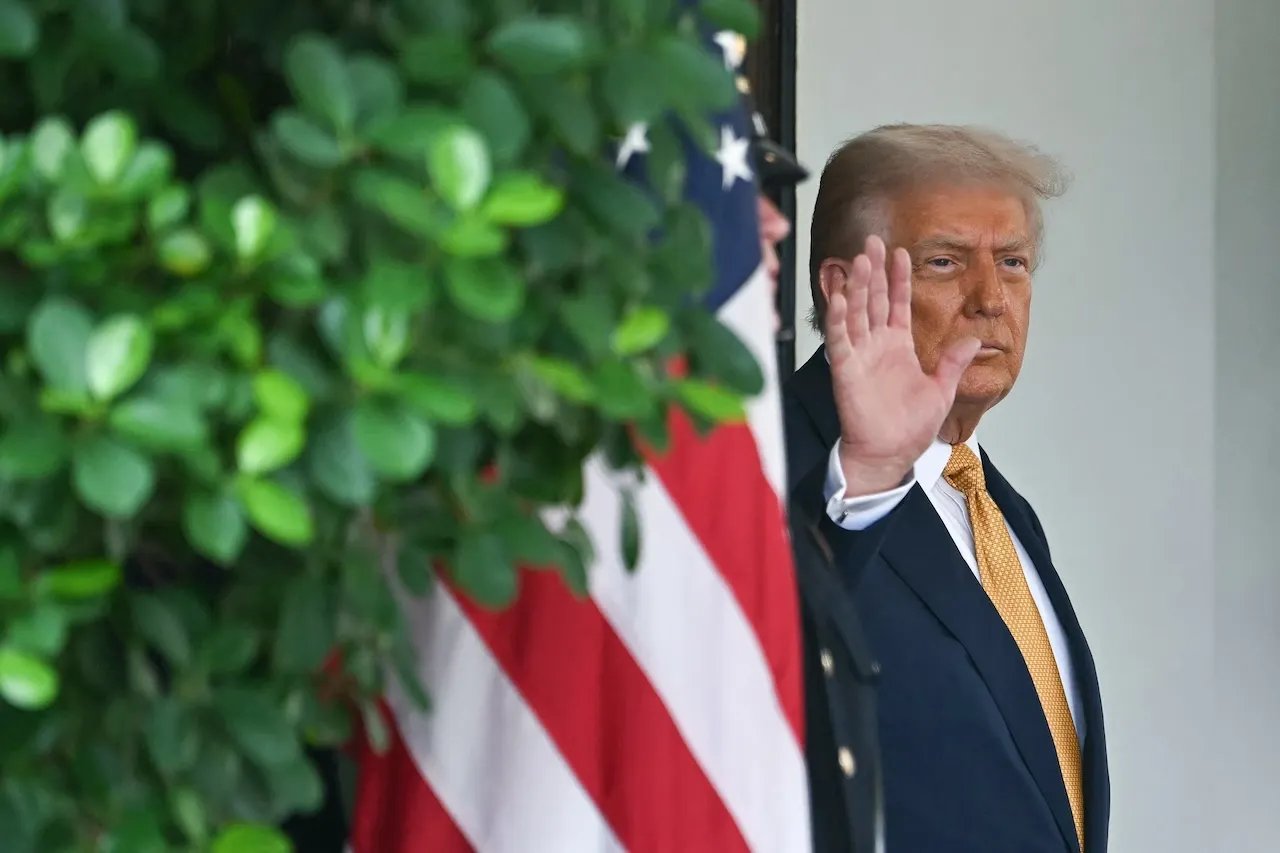
NEWYou can now listen to Fox News articles!
A federal court fight over President Donald Trump’s authority to unilaterally impose sweeping tariffs on U.S. trading partners is expected to be appealed to the Supreme Court for review, legal experts told Fox News Digital, in a case that has already proved to be a pivotal test of executive branch authority.
At issue in the case is Trump’s ability to use a 1977 emergency law to unilaterally slap steep import duties on a long list of countries doing business with the U.S.
In interviews with Fox News Digital, longtime trade lawyers and lawyers who argued on behalf of plaintiffs in court last week said they expect the ruling from the U.S. Court of Appeals for the Federal Circuit in a matter of «weeks,» or sometime in August or September – in line with the court’s agreement to hear the case on an «expedited» basis.
The fast-track timeline reflects the important question before the court: whether Trump exceeded his authority under the International Emergency Economic Powers Act (IEEPA) when he launched his sweeping «Liberation Day» tariffs.
FEDERAL JUDGES GRILL TRUMP LAWYERS OVER ‘LIBERATION DAY’ TARIFFS ON EVE OF ENFORCEMENT
President Donald Trump, alongside Secretary of Treasury Scott Bessent and then-Secretary of Commerce nominee Howard Lutnick, speaks to the press in the Oval Office of the White House on Feb. 3, 2025. (Jim Watson/AFP via Getty Images)
Importantly, that timing would still allow the Supreme Court to add the case to their docket for the 2025-2026 term, which begins in early October. That could allow them to rule on the matter as early as the end of the year.
Both Trump administration officials and lawyers for the plaintiffs said they plan to appeal the case to the Supreme Court if the lower court does not rule in their favor. And given the questions at the heart of the case, it is widely expected that the high court will take up the case for review.
In the meantime, the impact of Trump’s tariffs remains to be seen.
Legal experts and trade analysts alike said last week’s hearing is unlikely to forestall the broader market uncertainty created by Trump’s tariffs, which remain in force after the appeals court agreed to stay a lower court decision from the U.S. Court of International Trade.
Judges on the three-judge CIT panel in May blocked Trump’s use of IEEPA to stand up his tariffs, ruling unanimously that he did not have «unbounded authority» to impose tariffs under that law.
Thursday’s argument gave little indication as to how the appeals court would rule, plaintiffs and longtime trade attorneys told Fox News Digital, citing the tough questions that the 11 judges on the panel posed for both parties.
TARIFF FIGHT ESCALATES AS TRUMP APPEALS SECOND COURT LOSS

President Donald Trump delivers remarks on tariffs in the Rose Garden of the White House, April 2, 2025. (Reuters/Carlos Barria/File Photo)
Dan Pickard, an attorney specializing in international trade and national security issues at the firm Buchanan Ingersoll & Rooney, said the oral arguments Thursday did not seem indicative of how the 11-judge panel might rule.
«I don’t know if I walked out of that hearing thinking that either the government is going to prevail, or that this is dead on arrival,» Pickard told Fox News Digital. «I think it was more mixed.»
Lawyers for the plaintiffs echoed that assessment – a reflection of the 11 judges on the appeals bench, who had fewer chances to speak up or question the government or plaintiffs during the 45 minutes each had to present their case.
«I want to be very clear that I’m not in any way, shape or form, predicting what the Federal Circuit will do – I leave that for them,» one lawyer for the plaintiffs told reporters after court, adding that the judges, in his view, posed «really tough questions» for both parties.
Oregon Attorney General Dan Rayfield, who helped represent the 12 states suing over the plan, told Fox News Digital they are «optimistic» that, based on the oral arguments, they would see at least a partial win in the case, though he also stressed the ruling and the time frame is fraught with uncertainty.
In the interim, the White House forged ahead with enacting Trump’s tariffs as planned.
Pickard, who has argued many cases before the Court of International Trade and the U.S. Court of Appeals for the Federal Circuit, noted that the oral arguments are not necessarily the best barometer for gauging the court’s next steps – something lawyers for the plaintiffs also stressed after the hearing.
JUDGES V. TRUMP: HERE ARE THE KEY COURT BATTLES HALTING THE WHITE HOUSE AGENDA
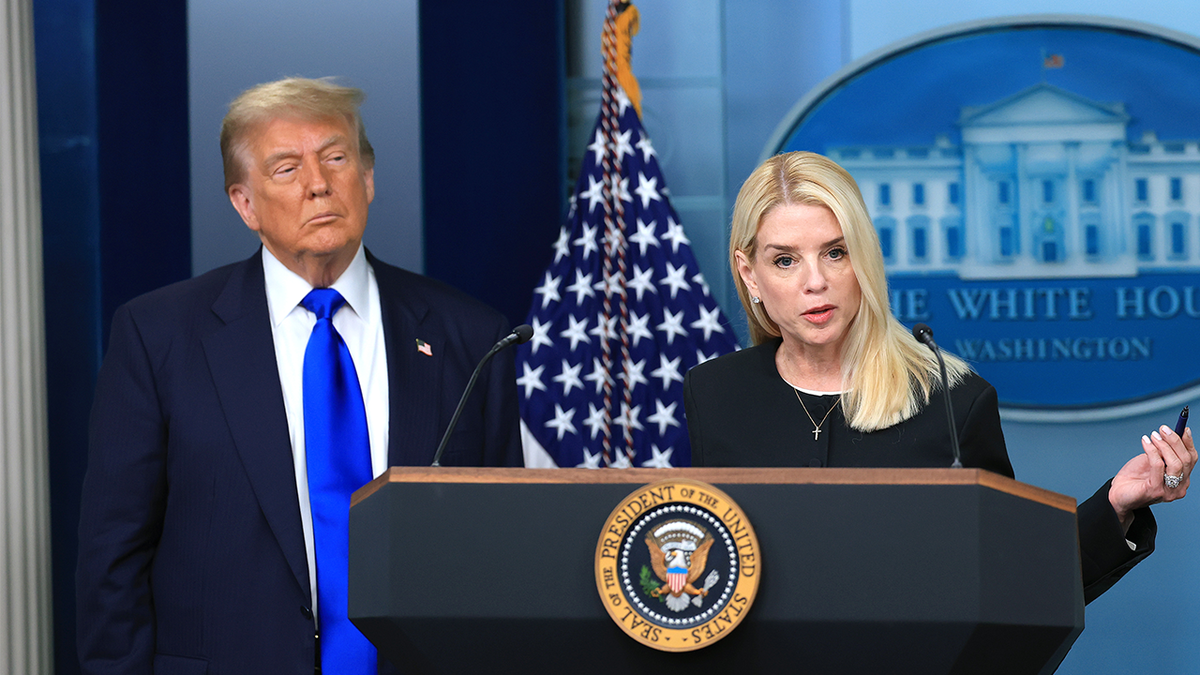
Attorney General Pam Bondi speaks alongside President Trump at the White House after the Supreme Court ruled judges cannot issue nationwide injunctions. (Joe Raedle/Getty Images)
Even if the high court blocks the Trump administration from using IEEPA, they have a range of other trade tools at their disposal, trade lawyers told Fox News.
The Trump administration «has had more of a focus on trade issues than pretty much any other administration in my professional life,» Pickard said.
«And let’s assume, even for the sake of the argument, just hypothetically, that the Supreme Court says this use of IEEPA exceeded your statutory authority. The Trump administration is not going to say, like, ‘All right, well, we’re done. I guess we’re just going to abandon any trade policy.’
«There are going to be additional [trade] tools that had been in the toolbox for long that can be taken out and dusted off,» he said. «There are plenty of other legal authorities for the president.
«I don’t think we’re seeing an end to these issues anytime soon – this is going to continue to be battled out in the courts for a while.»
Both Pickard and Rayfield told Fox News Digital in separate interviews that they expect the appeals court to rule within weeks, not days.
The hearing came after Trump on April 2 announced a 10% baseline tariff on all countries, along with higher, reciprocal tariffs targeting select nations, including China. The measures, he said, were aimed at addressing trade imbalances, reducing deficits with key trading partners, and boosting domestic manufacturing and production.
Ahead of last week’s oral arguments, U.S. Attorney General Pam Bondi said lawyers for the administration would continue to defend the president’s trade agenda in court.
CLICK HERE TO GET THE FOX NEWS APP
Justice Department attorneys «are going to court to defend [Trump’s] tariffs,» she said, describing them as «transforming the global economy, protecting our national security and addressing the consequences of our exploding trade deficit.»
«We will continue to defend the president,» she vowed.
federal courts,donald trump,politics,supreme court,federal judges
INTERNACIONAL
Johnson dines with Netanyahu in landmark visit, highest US official to visit occupied West Bank
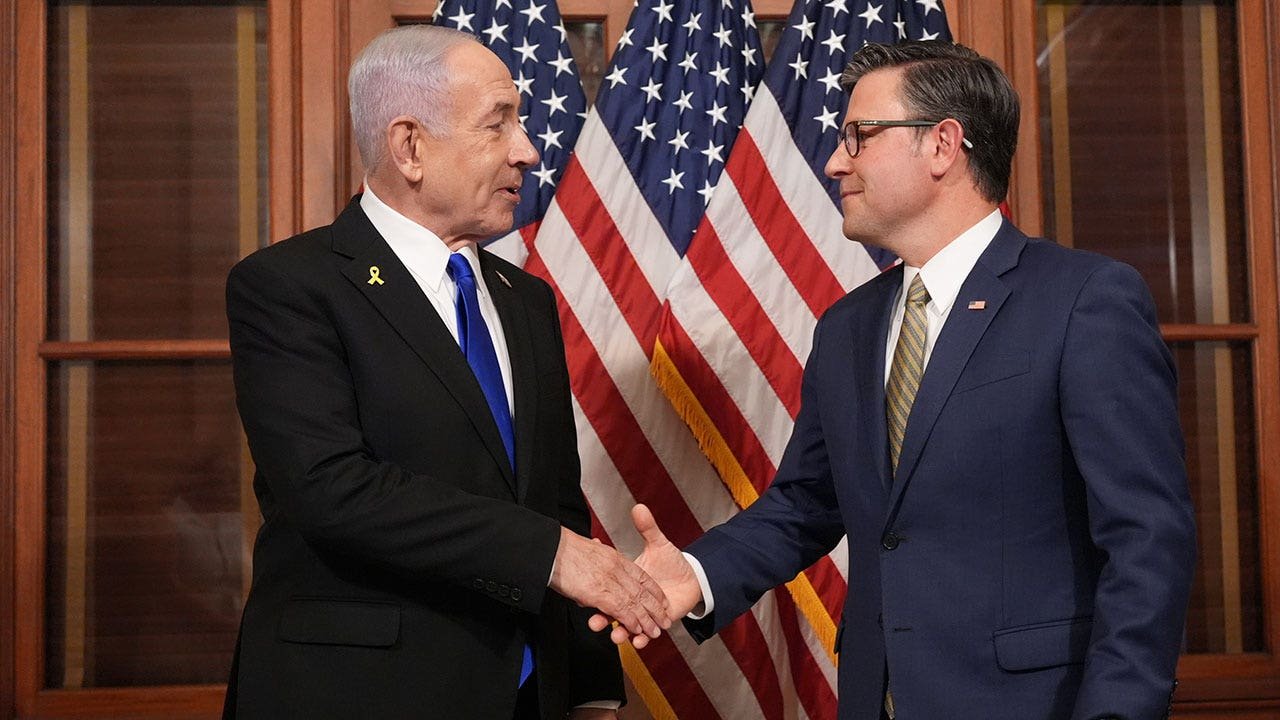
NEWYou can now listen to Fox News articles!
FIRST ON FOX: Speaker of the House Mike Johnson dined with Israeli Prime Minister Benjamin Netanyahu in Judea and Samaria on Monday, in a visit that marked the most senior visit from a U.S. official to what is still internationally considered the occupied West Bank, but which has become a highly divisive topic in the U.S.
Though the dinner discussion largely focused on the ongoing war in Gaza and how to better secure aid deliveries as Hamas continues wreck on food access, Fox News Digital confirmed with Heather Johnston, the founder of the U.S. Israel Education Association – whose organization planned Johnson’s trip – that he and his delegation will also be meeting with Palestinian leaders during his Middle East visit.
Johnson, whose visit is considered a «private» trip and not an official state visit as it was organized by the association, also met with Israeli officials in the city of Ariel ealier on Tuesday – just over 10 miles from the Green Line, the armistice line marking the borders between Israel and the disputed Palestinian territories.
Though it is not unusual for members of Congress to travel to Israel under private means, including previous Speakers of the House like Kevin McCarthy who also met with Netanyahu in 2023, the location of the Johnson-Netanyahu dinner is significant.
EUROPEAN LEADERS DECRY HAMAS VIDEO OF ISRAELI CAPTIVES: ‘UNLIMITED INHUMANITY’
US House Speaker Mike Johnson, a Republican from Louisiana, right, and Benjamin Netanyahu, Israel’s prime minister, shake hands during a meeting at the US Capitol in Washington, DC, US, on Tuesday, July 8, 2025. (MENAHEM KAHANA/AFP via Getty Images)
Republicans in Congress have introduced legislation that would require all official U.S. documents to use the name «Judea and Samaria» rather than the West Bank, which it argues has become a «highly divisive label.»
Judea and Samaria refers to the historical and religious ties Israel has to an area that is internationally recognized as the West Bank, and which Israel captured from Jordan during the 1967 war after Amman first seized the territory of Mandatory Palestine, now dubbed the West Bank, during the Israel-Arab war of 1948.
It has since been deemed illegally occupied by the UN and the international community, though the U.S. has fluctuated over its views of the occupation status since President Donald Trump first entered office in 2017.

An Israeli soldier is seen during a protest in the town of Beita, in West Bank on July 26, 2024. (WAHAJ BANI MOUFLEH/Middle East Images/AFP via Getty Images)
NETANYAHU RESPONDS AFTER ISRAELI HOSTAGE SEEN EMACIATED, DIGGING GRAVE: ‘CRUELTY OF HAMAS HAS NO BOUNDARIES’
Trump evaded questions earlier this year over whether he would support Israel’s annexation of parts of the West Bank despite his strong support for Jerusalem.
But regardless of whether it has the backing of Israel’s chief ally, top officials in Netanyahu’s administration have made clear they intend to annex territory officially and less than two weeks ago the Israeli government passed a non-binding resolution that said Jerusalem should «apply Israeli sovereignty, law, judgment and administration» to the West Bank.
Johnson’s office did not immediately respond to Fox News Digital’s questions about the significance of his visit.
Though it could suggest U.S. lawmakers may take a more decisive role in backing Israel’s expansionist plans as the Trump administration looks to end Israel’s war in Gaza while still opposing European and Arab nation’s increased push for an independent state of Palestine.
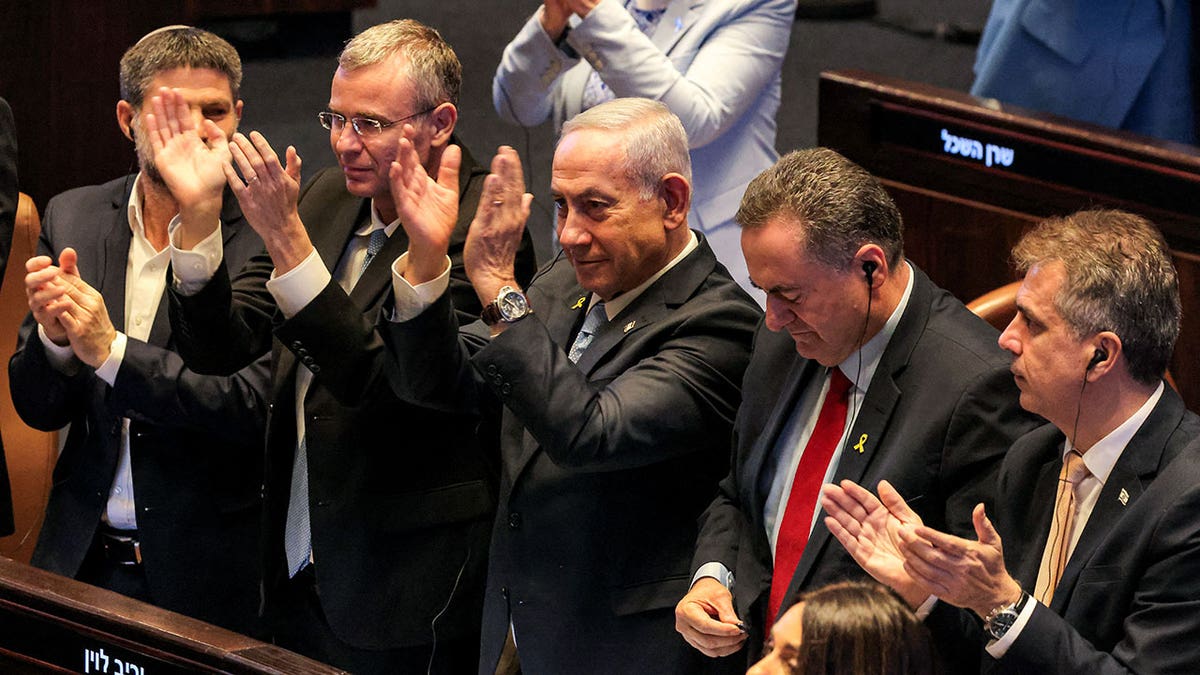
Israel’s (L to R) Finance Minister Bezalel Smotrich, Justice Minister Yariv Levin, Prime Minister Benjamin Netanyahu, Defence Minister Israel Katz, and Energy and Infrastructure Minister Eli Cohen applaud during a session of the Israeli parliament (Knesset) at its headquarters in Jerusalem on June 11, 2025. (MENAHEM KAHANA/AFP via Getty Images)
CLICK HERE TO GET THE FOX NEWS APP
The Times of Israel also reported last week that Justice Minister Yariv Levin and Defense Minister Israel Katz, the latter of which who Johnson met with on Sunday, believe that «at this very moment, there is a moment of opportunity that must not be missed» to implement «Israeli sovereignty in Judea and Samaria.»
The report did not confirm why this moment in time is so significant.
israel,mike johnson,benjamin netanyahu,middle east,world
INTERNACIONAL
De Godzilla a Astro Boy: cómo las bombas atómicas sobre Hiroshima y Nagasaki transformaron la cultura de Japón
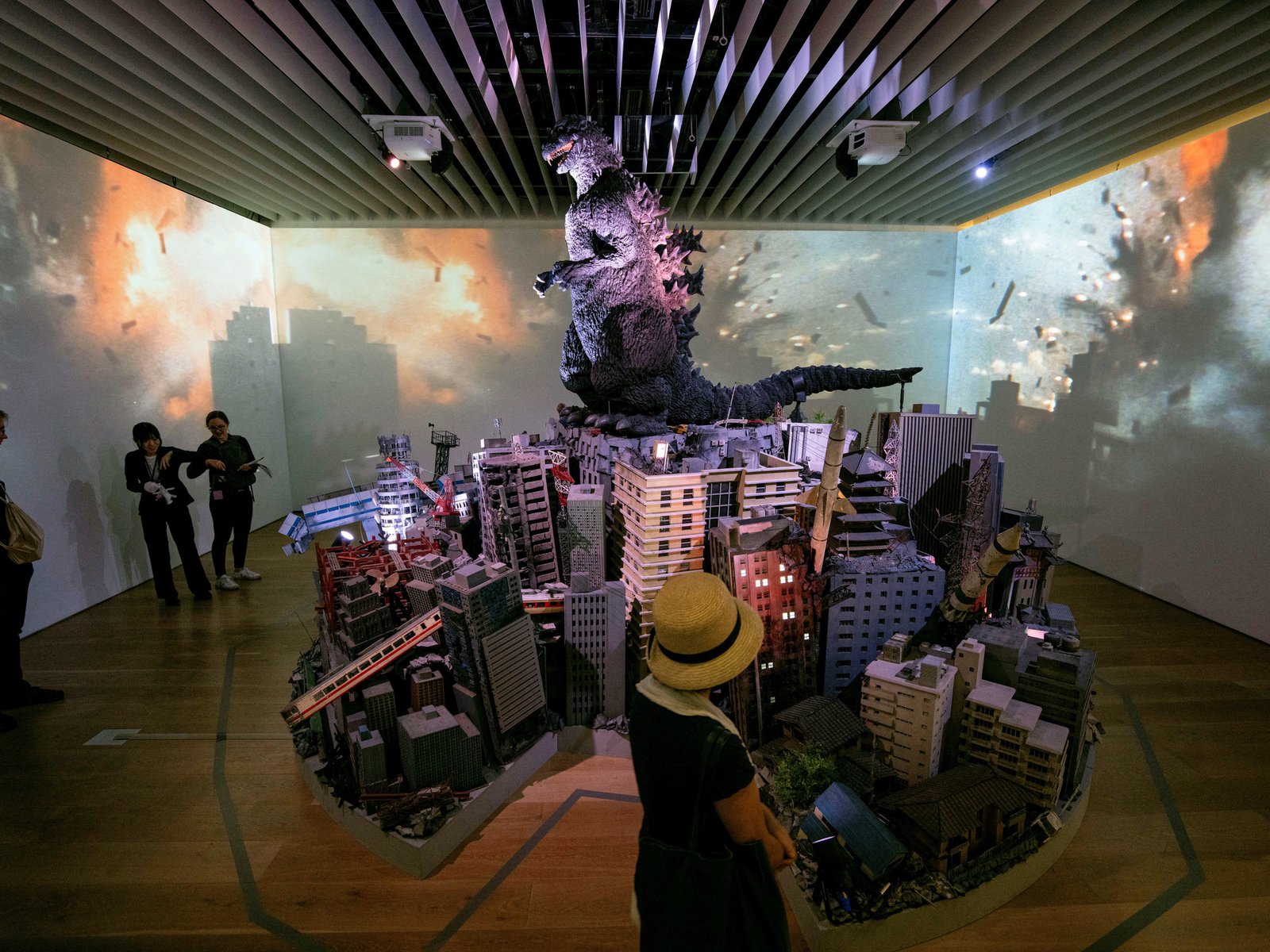
El vínculo con la muerte

 POLITICA3 días ago
POLITICA3 días agoMilei interrumpió la nota con Fantino para firmar un decreto: avaló contrarreloj una suba a estatales y residentes del Garrahan

 POLITICA3 días ago
POLITICA3 días agoMurió el general Carlos Laidlaw, un militar dedicado a la estrategia y la geopolítica

 CHIMENTOS3 días ago
CHIMENTOS3 días agoMauro Szeta reveló la información más dura de la muerte de Mila Yankelevich: «Eso causó el deceso»

